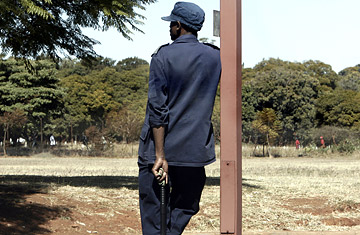
A Zimbabwean police officer stands watch over the site where the Movement for Democratic Change opposition party had planned to hold its main pre-election rally on June 22, 2008, in Harare. Up to 1,000 government supporters armed with sticks had gathered at the venue, but later moved on to the ruling party headquarters.
Morgan Tsvangirai's decision to seek shelter at the Dutch embassy hours after announcing his withdrawal from Zimbabwe's runoff presidential election signals the collapse of organized efforts to unseat President Robert Mugabe. The 84-year-old despot who has ruled his country for 28 years and plunged it into economic ruin is now certain to remain in office, whether he is reelected on Friday or he declares himself the winner — as the sole candidate — before then. Mugabe had, of course, declared himself the winner long before Tsvangirai pulled out, making clear that he would not allow the opposition leader to take power regardless of the verdict of the electorate. Now, despite the fact that Tsvangirai's Movement for Democratic Change (MDC) won a parliamentary majority on March 29, it may have little influence over the country's immediate future.
Much depends on whether Mugabe, who has signaled his contempt for the popular will, nevertheless respects the norms of parliamentary democracy. Even more hangs on whether the security forces and their allied militias keep up the campaign of terror against the MDC. Tsvangirai's move to seek shelter on foreign soil suggests that he believes the signs are not good. The precise reasoning behind his decision may never be known, but its message to his supporters is as grim as it is clear: We can't win; save yourselves.
The world has greeted Mugabe's victory with outrage. There are moves to impose U.N. Security Council sanctions against Zimbabwe and pressure African governments to turn the screws on their neighbor and his junta — an option they must weigh against the likely consequence of an even greater influx of Zimbabwean refugees into surrounding countries. The Security Council unanimously adopted a statement Tuesday condemning the government's "campaign of violence" that had "denied its political opponents the right to campaign freely." Tsvangirai said the U.N. resolution (the Council's first formal action on the crisis) was "very important," adding: "It recognizes the people who are accountable for the violence and it squarely places that responsibility at Mugabe's leadership." But none of this will do much to unseat Mugabe, or to help ordinary Zimbabweans. That moment has passed.
The world once believed better of Mugabe. When he took power in 1980 after defeating the white minority regime of Ian Smith's Rhodesia, Mugabe surprised many by embracing capitalism, democracy and reconciliation with his former oppressors. Still, a vicious authoritarian streak quickly became visible in the early '80s, when he sent his army's notorious Fifth Brigade into the southern strongholds of his then chief rival, Joshua Nkomo, where they killed more than 10,000 ethnic Ndebele. When economic decline turned the electorate increasingly against Zanu-PF during the late '90s, Mugabe once again cloaked himself in the mantle of revolutionary socialism, defending his people from the ravages of Western imperialism. And imbued with that messianic vision, Mugabe is not shy about his use of force; he once boasted that he had, in addition to his seven academic degrees, a "degree in violence."
Rather than an opportunity to unseat Mugabe, the 2008 election may turn out to have been a chance for him to identify his opponents and unleash his forces on them. And instead of reforming Zimbabwe's autocratic political system, the election has reaffirmed that the fate of Zimbabwe is indivisible from the fate of Mugabe.
So what is Zimbabwe's future? The small élite around Mugabe will continue to live in luxury, stealing from state coffers, appropriating land from the few remaining white farmers and working Zimbabwe's exchange rate (they buy U.S. dollars at an official rate that has little bearing on market reality, then resell them on Harare's black market at spectacular profits) to fund lavish shopping sprees in Johannesburg. The MDC will likely enter a period of introspection. The party healed a split in its ranks only after the March poll, and Tsvangirai's rivals within the MDC are now likely to reemerge to challenge him.
And then there's the fate of ordinary Zimbabweans, millions of whom have fled to neighboring countries, the rest left to cope with 80% unemployment and inflation of more than 100,000%. There's no end in sight to their suffering. Even in the security forces, below the most senior ranks, growing unhappiness with the regime echoes the resentment of the general population. But Mugabe has proved that power in Zimbabwe is based not on votes or the popular will but on the ability to monopolize violence. Until he faces a greater force or loses command of his own, Zimbabwe's power equation is unlikely to change.
